- Home
- Anne Rivers Siddons
Islands Page 23
Islands Read online
Page 23
When we were at the creek in summer, we did very little, and did it very slowly. Having an indolent streak in my deepest soul, I cherished the sweet nothingness. Lewis, still a dervish even after all the years I had known him, slowed down and was content, up to a point, to lie on the porch reading or float aimlessly in the screened-in, shaded pool. He could do it for only about a half day, and then he began to prowl, and would soon take his fishing gear and go out in the Whaler, or borrow Simms’s boat and sail as far down the creek as it took to catch a little wind.
Simms and Lila did not love the marsh in summer. They came to be with us, but they did not stay on as we sometimes did, and the heat seemed to punish and cripple them. They took to leaving early to go back to Charleston, pleading business pressures. But I knew that the constant sweat bled something vital out of them. In late July Simms had a couple of men from the plant come and install air-conditioning in their house, and after that they stayed a bit longer. Lewis and I had big, sluggish ceiling fans that did absolutely nothing but stir the fetid air, but I think it seemed to us that anything more would disturb the immutable rhythm of the seasons on the marsh. It did not, however, prevent us from relishing the cool, dry air when we had dinner with Lila and Simms. Only Camilla seemed to be truly comfortable in August. She was very thin; warmth and humidity seemed to nourish her like a blood transfusion. Even I wondered at her capacity for heat. She bloomed in it, like an orchid.
My business slowed considerably in the dog days of summer, and I often came out to the creek a day or so before Lewis. He always had much to do around Sweetgrass, as I did, but in August I was simply incapable of focused action, and loved the world of the marsh and creek precisely because I could let myself, without guilt, swirl and float on its surface. Camilla was almost always there now, though she seldom went outside except to the pool cage. Lila and Simms hardly ever came that summer except for an occasional Saturday and part of Sunday. I wondered if they would come back to us in the cool of autumn, but it was a lazy wondering, without undue concern. I would care more about it in the fall. In August, what would be, would be.
The morning of the precise middle of August was already flat and white at eight o’clock, and the sheets were slick and molded to my body when I woke in the dim bedroom. I was alone, except for Gladys, who, to accommodate the heat, had wriggled down to the foot of the bed. Lewis was still at Sweetgrass, planning to come to the creek that evening. Simms and Lila were refrigerating comfortably in Charleston. I heard splashing from behind the house that told me Camilla was faithfully doing her laps in the pool. I looked out my window over the marsh to the creek. The tide was full out, and the marsh glimmered poisonously, like a dead fish in the low sun, and probably smelled like it. The creek had shrunk, as it did twice a day, to a ribbon. But unlike most recent days, its surface was ruffled. Wind. Out on the creek, a wind blew in from somewhere.
I pulled on shorts and a T-shirt and tied my hair back with a lace from some forgotten shoe, and padded barefoot out of the bedroom and into the kitchen. The air was stale and hot, but the tiles were cool under my feet. I flipped on the overhead fan, and made coffee. As I stood drinking it and staring out at the little dappling of wind, Gladys came limping into the kitchen, toenails clicking on the tile. She nosed at her food without interest, but drank deeply from her water dish, and looked up at me as if to say, “Just another shitty day in paradise, huh?”
“I tell you what, Gladys,” I said. “There’s a breeze out on the water. Remember breezes? Let’s take the Whaler out and find it. It may not last.”
She thumped her tail. I put on a white cotton hat and flip-flops and slathered on sunscreen and insect repellent, and we went out into the still morning. Whatever wind there was did not reach the house. The humidity was like a wet wool overcoat.
Camilla was on her front porch watering pots. She wore a white terry beach wrap and sunglasses, and her wet hair was braided and hung down her back.
“Where are you two going?” she called out.
“Out in the Whaler. There’s a breeze out there. It looks like heaven.”
“Don’t stay too long. Breeze or no, you could die in that sun if you broke down and nobody was around.”
“We’ll be back in a couple of hours,” I said, and waved, and Gladys and I went down the wooden walkway to the dock, stepping skittishly on the already sizzling boards.
Gladys was so lame that I had to lift her into the Whaler, but once in she struggled up into her usual seat beside me, and I nosed the boat out into the dwindled creek. There was an avenue of water scarcely wider than a city street, but it was freckled with wind, and glinted in the sun. We picked up speed, and Gladys’s ears blew back, and she gave a great doggy sigh of contentment.
I hugged her lightly.
“Don’t tell me this isn’t better than that phony screened pool,” I said, and she grinned at me around her lolling tongue.
We followed the small wind down the creek for about an hour, until we reached the bend that I knew sheltered one of the great prehistoric shell mounds that dot the Low Country marshes. The wind began to drop and I could feel sweat popping out at my hairline.
“Enough for one day,” I told Gladys. “By the time we get back, it’ll be lunchtime, and then naptime. But aren’t you glad we came?”
I turned the boat in a tight arc and we chugged slowly back up the creek, toward the dock. The tide was coming in, and the creek was slowly widening, spreading as infinitesimally through the marsh grass as a glacier. There was virtually no sound from the forest: no birdsong, no plop of mullet, no rustle of grass or small splash as a turtle or water snake slid into the slow water. Not even the whine of mosquitoes or the dry burr of cicada. In another month, the creek and woods would be alive with the comings and goings of its villagers, but today it was an underwater place, totally stopped and still. Gladys nodded in the sun and barked at nothing.
We were not far from the dock when her head snapped up and she raised her muzzle and sniffed feverishly. I could not imagine what she was searching the wind for. I heard nothing but the low rumble of our motor. As I cut it and glided the Whaler in toward the dock, she sprang up on the seat with a vigor that I had not seen for years, and began to bark: urgent, full-throated bronze barks that I could imagine coming from her throat years before, in the fields and woods of autumn. I hardly had us stopped, wallowing, beside the dock when she was out of the boat and running down the walkway as if she had never been stiff or lame or old. I scrambled out and sprinted after her, calling. It crossed my mind that she was having some sort of seizure, or fit.
Halfway down she misstepped, and skidded off the planks and fell headlong into the marshy black water. I did not know how deep it was here; probably not very, but the mud was thick and deep and sticky, and the grasses obscured vision. Gladys began to thrash and whine. I went off the dock after her.
The water came up only to my waist, but it was over her head. My feet sank deep into the silky, sucking mud. I could not see Gladys, only the frantic thrashing, but I grabbed for her and got her, and lifted her, still struggling, into my arms, and heaved her up onto the dock. She was coated from nose to tail with the foul-smelling mud, and I was slimed with it, too. Before I could wipe it out of my eyes, she was gone again down the dock, barking and falling, getting up, running, falling again. I caught her and grabbed her up in my arms and headed up the bank with her, trying hard to hold her still. I could feel her heart, like a trip-hammer. A vet; I would have to get her to a vet….
She broke free once more and bolted toward Camilla’s house. I started to follow her and then stopped.
A dusty old pickup truck stood in the center of the driveway circle, and on Camilla’s porch a tall, stooped, wire-thin old man was just raising his hand to knock. He turned toward us, and my knees almost gave way with shock. Henry. It was Henry.
He saw Gladys struggling toward him, and reached her with two steps and gathered her up into his arms. She wriggled and whined and yipped with deliri
ous joy, and lapped at his gaunt face with a frantic tongue. He held her, burying his face in her filthy coat. He raised it when I reached them. His face was as filthy with mud as Gladys and I were, and tears cut pale tracks through it on both cheeks.
“Henry,” I whispered, and began to cry, too, and threw my arms around him and Gladys. We tumbled together onto the gravel drive, man, woman, and dog, a tableau of homecoming sculpted of primal Low Country clay.
“You’re the dirtiest girls I ever hugged,” Henry said in a faded ghost of his old slow, sweet voice, and then we simply sat and held each other, and cried.
Presently the hammering of my heart slowed, and I lifted my head and looked at Henry. His face was white and mud stained, but he was clean shaven, and his sunken blue eyes were clear. His silvery hair fell in a tangled sheaf over his eyes. It was longer than I had ever seen it. I could feel his bones, sharp as dead branches, through the faded, mud-stained old denim workshirt that he wore. You could have counted every rib. There were still tear tracks in the mud on his face, but he was not crying anymore. His eyes had a look of great distances; I had never seen that before. Henry had always been so totally with you, so absolutely in the moment. Who was this man?
“Henry,” I began, but he touched my lips with his fingers and I fell silent. Gladys was attempting to burrow herself under his arm, and he patted her absently.
“I can’t, now, Anny,” he said, in the cracked new voice. “I just can’t. Later on, maybe, we’ll talk about it, but not yet. It’s like I’ve been living in some kind of nightmare, and everything after the fire is beginning all over again. I need to know you all are around me, but I have to start over with all this, and I need to do it alone. I need to feel it all, now. I’ve been drunk for a long time.”
He was trembling, a fine shivering all over. I had seen it before. My mother used to do it, in the claws of a savage hangover. Many of my little clients’ parents did. But his eyes were clear, and there was not that sweet, yeasty smell about him that spoke of advanced alcoholism. If he had been a drinker, he was not now a drunk. Just a frail wreck of a man.
I nodded silently, with my arms still on his shoulders. Gladys settled herself under his arm and fell silent. We were still sitting like that on the gravel drive, holding lightly to each other and not speaking, when a screen door banged and I looked up to see Camilla running down the steps of her house. I had not seen her run in years; she moved very carefully now. But on this day she ran as lightly as a girl, her pigtail flying out behind her. She wore a light, sheer flowered cotton skirt that drifted around her ankles, and a white sleeveless blouse. She was entirely the young Camilla who had laughed and danced with Lewis and Henry on the hot summer sand of the Sullivan’s Island beach, long ago. Before she reached us, Henry climbed painfully to his feet and stood still, with his arms open, and she ran into them.
She held him hard. I could not see her face.
“I’ve been waiting for you,” I heard her say. “I thought you’d come about now. I’ve had a pot of gumbo in the freezer for days. You can tell us about the odyssey of Henry McKenzie over a feast tonight. I’ll call Lila and Simms.”
Her voice was fluting with happiness, and a sort of joyful certainty. She was not, I thought, surprised to see him. With the delicate radar she seemed to employ as far as Henry went, and to an extent, Lewis, she had known he was coming, and almost when. Well, I thought, it was the three of them almost since they could walk. That kind of bond can’t be broken.
She stepped back from Henry, still holding his hands, and made as if to pull him gently toward the steps, but he stood still, shaking his head.
“Cammy, no,” he said in the frail voice. “Later, but not now. Right now I just need to get clean and sleep. It’s been a long time since I’ve slept. I heard from Nancy that you all were staying out at some marsh place that Simms owned, and I remembered that he’d bought Booter’s place, and I took a chance. I’m sorry to just bust in on you like this, but right now I…don’t have any place to go. I can’t go back to Bedon’s Alley….”
“Of course not. You’ve come home. We have a place waiting for you; it’s been ready almost since we first came out here. It’s back behind the pool. I’ll show you. You take a long shower and hop in bed and we’ll let you sleep till you wake up. You can’t hear us from there.”
“Gladys…”
Camilla smiled. “Of course, Gladys. We couldn’t keep her out with six feet of barbed wire. Come on, now. I’ll take your clothes and wash them while you’re asleep, and there’s plenty of food in your fridge. Did you bring any other clothes?”
“A few, in a duffle in the back of the truck. They’re in pretty bad shape. I don’t know what happened to all my clothes….”
His voice began to fade, and the distance came back into his eyes.
“No matter. I’ll sort them out,” Camilla said firmly. “Come on. When you feel up to it, the rest of us will probably be around one or another porch tonight and in the morning.”
She began to bustle him toward the little guest house in the palmetto forest behind the pool. I knew now why she had insisted on furnishing and decorating it just so, and stocking it with linens and silverware and dishes. She had had a window air-conditioning unit put in, too. The little house waited there all summer in the deep shade of the palms and live oaks, perfect and inviting, for guests who never came.
Instead, Henry had come. I knew that Camilla had meant it to be the home that he came to.
He held back under her gently urging hand, and looked at me.
“I’ve missed you,” he said limply, and I began to cry again.
“You’ll never know how we’ve missed you,” I whispered. “You’ll just never know.”
“I hope I will, someday,” Henry said, and turned to follow Camilla up the path toward a bath and food and sleep.
I called Lewis at Sweetgrass and he called Simms and Lila, and by late afternoon we were all gathered at the creek, having drinks on Camilla’s front porch and talking of Henry.
“How was he?” “How did he seem?” they asked me over and over, and I could only shake my head helplessly.
“Old. Half sick. Weak. I don’t know,” I said. “He’s not really Henry. How could he be, after what he’s been through? Let’s wait and see how he is when he gets his bearings.”
“But did he say where…?” “Did he talk about Fairlie?” “Will he be staying here?” “Is he going back to medicine?”
“I don’t know,” I said. “I just don’t know. We really didn’t talk.”
“Then what did you do?” Lila said impatiently.
“Sat in the driveway with our arms around each other and Gladys and cried,” I said.
“Henry cried?” Simms was shocked.
“If he hadn’t cried, I’d cart him straight off to a shrink,” Camilla said crisply. “Anny’s right. We need to let him be, let him call the shots.”
“But what will we talk to him about?” Lila wailed, and all at once I wanted to shake her.
“What did you ever talk about?” I said.
“Well, you know. Just stuff.”
“Just stuff will do fine.”
Henry slept for the rest of that day and night and most of the next day. Or at least, if he did not sleep, neither did he leave the guest house, and we saw no lights and heard no sounds. A couple of times Gladys came clicking out the slightly open front door and wandered into Lewis’s and my kitchen and had a bite and a drink, but she looked at me, startled and half guilty, wagged her tail, and padded back toward the guest house.
“It’s okay,” I said the first time she did it. “I know he’s back. He’ll want you there when he wakes up.” And off she went.
In the morning Camilla tiptoed into the guest house with a pile of newly ironed clothes and a pitcher of fresh orange juice, but she did not stay.
“Still sleeping,” she said. “I could hear him snoring.”
“I think that’s Gladys,” I said. “She can blow you out of
bed.”
“Well, whoever, they’re really sawing wood. I know you all wanted to see him, but I think it would be better, if he doesn’t come out by midafternoon, if everybody went back to their own place in town. Maybe he should just ease into the group one at a time.”
“That one being you,” Lila said.
“You know I always stay out here part of Monday,” Camilla said. “I just want to see if he needs anything. Then I’ll leave him be. But I’m not going to leave him totally alone out here. Not for a while. He’s going to start remembering in earnest now, and I want to be here if he wants to talk.”
But apparently Henry did not want to talk. At least, not about Fairlie, or the fire, or his lost time in the Yucatán. Camilla reported at midweek that he had caught up on his sleep and was eating like a sailor on shore leave, and had begun to lose the terrible skeletal look in his face and arms. He spent a lot of time dozing in the sun or reading in the pool cage, Gladys stuck to his side like a cocklebur, and he took the little kayak that Simms had brought out into the creek and vanished out of sight in the marshes for hours at a time.
“Does he talk?” I asked, when she called.
“Oh, yes. But not about…all that. He talks about the land around here—apparently he and Lewis used to hang around here with somebody named Booter—and he talks about Gladys, and dogs in general, and the state of medicine today, and what’s happening to downtown with the tourists and all. And he talks a lot about the old days.”
“At the beach house?”
“No. Earlier. When he and Lewis and I were kids out on the island. I’d forgotten how awful he and Lewis were. He laughs a lot about that.”
“So we shouldn’t mention the other stuff….”

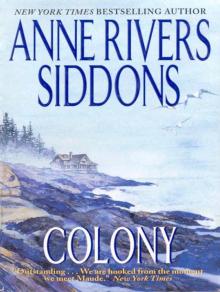 Colony
Colony Nora, Nora
Nora, Nora House Next Door
House Next Door Homeplace
Homeplace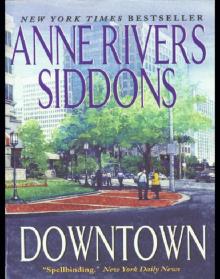 Downtown
Downtown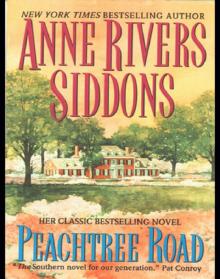 Peachtree Road
Peachtree Road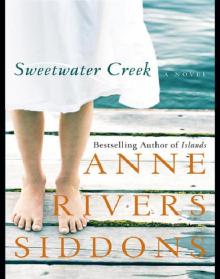 Sweetwater Creek
Sweetwater Creek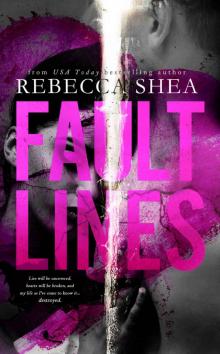 Fault Lines
Fault Lines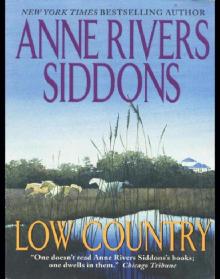 Low Country
Low Country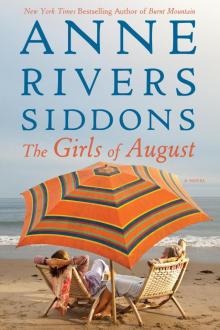 The Girls of August
The Girls of August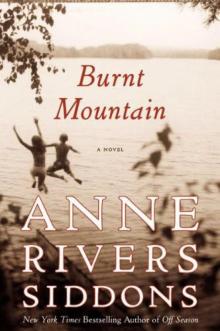 Burnt Mountain
Burnt Mountain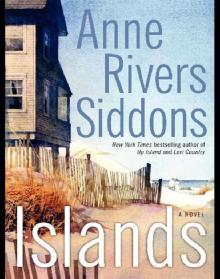 Islands
Islands